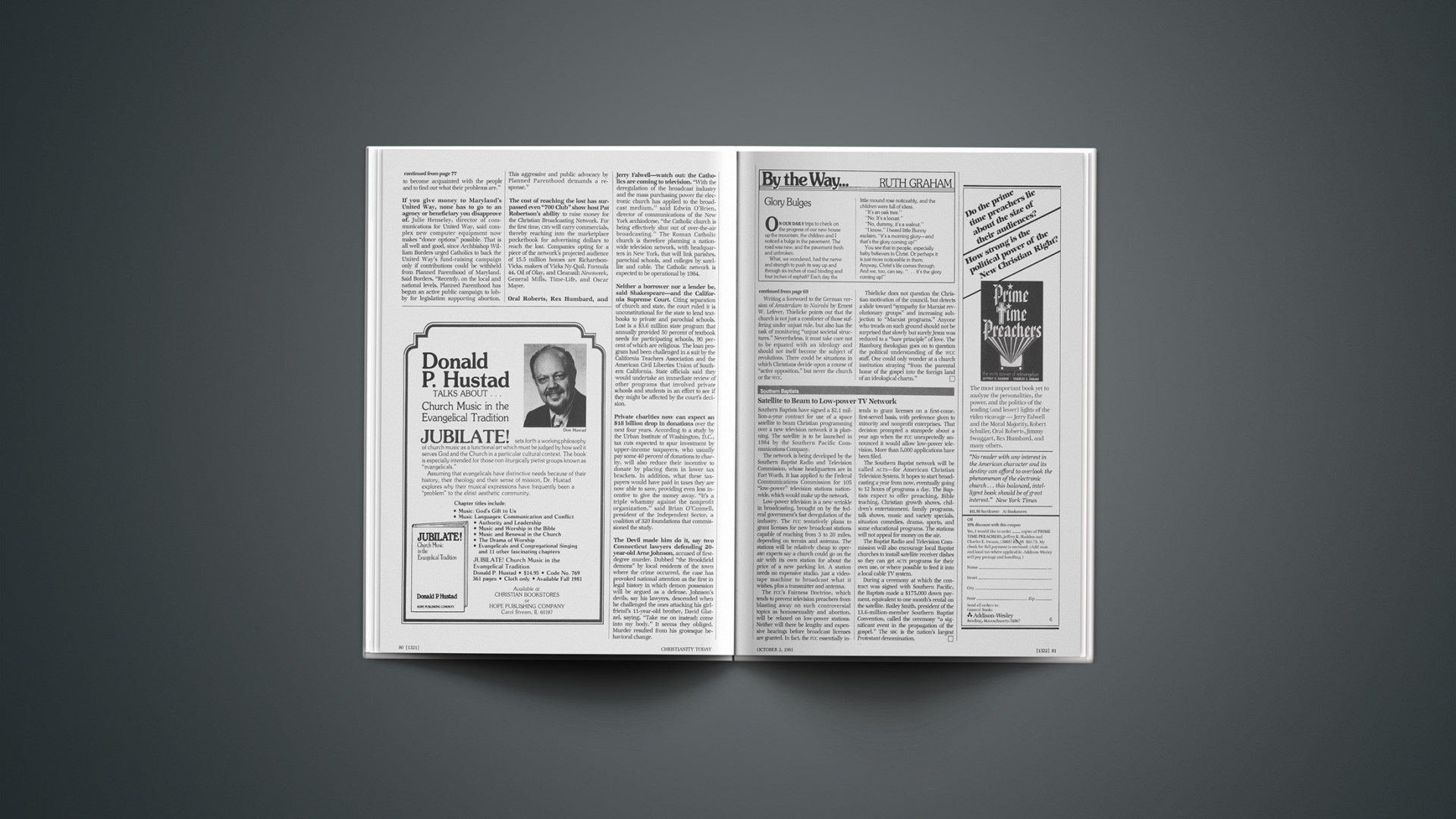On our daily trips to check on the progress of our new house up the mountain, the children and I noticed a bulge in the pavement. The road was new, and the pavement fresh and unbroken.
What, we wondered, had the nerve and strength to push its way up and through six inches of road binding and four inches of asphalt? Each day the little mound rose noticeably, and the children were full of ideas.
“It’s an oak tree.”
“No. It’s a locust.”
“No, dummy, it’s a walnut.”
“I know,” I heard little Bunny exclaim, “it’s a morning glory—and that’s the glory coming up!”
You see that in people, especially baby believers in Christ. Or perhaps it is just more noticeable in them.
Anyway, Christ’s life comes through. And we, too, can say, “… it’s the glory coming up!”
Southern Baptists
Satellite To Beam To Low-Power Tv Network
Southern Baptists have signed a $2.1 million-a-year contract for use of a space satellite to beam Christian programming over a new television network it is planning. The satellite is to be launched in 1984 by the Southern Pacific Communications Company.
The network is being developed by the Southern Baptist Radio and Television Commission, whose headquarters are in Fort Worth. It has applied to the Federal Communications Commission for 105 “low-power” television stations nationwide, which would make up the network.
Low-power television is a new wrinkle in broadcasting, brought on by the federal government’s fast deregulation of the industry. The FCC tentatively plans to grant licenses for new broadcast stations capable of reaching from 3 to 20 miles, depending on terrain and antenna. The stations will be relatively cheap to operate: experts say a church could go on the air with its own station for about the price of a new parking lot. A station needs no expensive studio, just a videotape machine to broadcast what it wishes, plus a transmitter and antenna.
The FCC’s Fairness Doctrine, which tends to prevent television preachers from blasting away on such controversial topics as homosexuality and abortion, will be relaxed on low-power stations. Neither will there be lengthy and expensive hearings before broadcast licenses are granted. In fact, the FCC essentially intends to grant licenses on a first-come, first-served basis, with preference given to minority and nonprofit enterprises. That decision prompted a stampede about a year ago when the FCC unexpectedly announced it would allow low-power television. More than 5,000 applications have been filed.
The Southern Baptist network will be called ACTS—for American Christian Television System. It hopes to start broadcasting a year from now, eventually going to 12 hours of programs a day. The Baptists expect to offer preaching, Bible teaching, Christian growth shows, children’s entertainment, family programs, talk shows, music and variety specials, situation comedies, drama, sports, and some educational programs. The stations will not appeal for money on the air.
The Baptist Radio and Television Commission will also encourage local Baptist churches to install satellite receiver dishes so they can get ACTS programs for their own use, or where possible to feed it into a local cable TV system.
During a ceremony at which the contract was signed with Southern Pacific, the Baptists made a $175,000 down payment, equivalent to one month’s rental on the satellite. Bailey Smith, president of the 13.6-million-member Southern Baptist Convention, called the ceremony “a significant event in the propagation of the gospel.” The SBC is the nation’s largest Protestant denomination.
Church of England
Bishop Dismayed By Shift To Right
A Church of England bishop has expressed dismay that the moderate party within his denomination is rapidly declining. Says Denis Wakeling, bishop of Southwell: “Central churchmanship, liberal in theology, tolerant in practice, which formed the hard core of Church of England membership … has been virtually eliminated by the idea that we should have ‘convictions’ of the Evangelical or Catholic kind.”
Wakeling, whose diocese includes the industrial city of Nottingham, was not happy about expressing the division as one between radicals and traditionalists. It was, he said in his Southwell Diocesan News, between “those who believe that clear-cut convictions are all important and must be proclaimed, and those who think that truth is less easily defined and is something we seek rather than a sword we brandish.”
In an age when missions are stressed more than mission (“even Billy Graham all over again”), liberal ordinands are being rejected because they are thinkers rather than activists. “Liberal-minded Christians,” asserts the bishop, “actually believe something as much as radicals do; they are not unconvinced or faithless, but just being as honest as they can.”
Turkey
Martial Law Hampers Gospel
The year-old military regime of General Kenan Evren, 62, imposed martial law and a three-hour curfew every night on Turkey. Evren curbed terrorism and inflation, strove to keep Turkey in the community of parliamentary democracies (albeit through a hand-picked constituent assembly), and simultaneously curtailed the abuse of freedom by extremists.
The power of Islam is the single unifying factor in a land that is ethnically and religiously divided. The tiny Christian minority (Syriac, Armenian, Arab Orthodox, Greek, Catholic) is often under attack by fanatical Muslims. At least two Christians leaders are in prison without charges being brought. Christian numbers are diminishing further as members leave the country.
The Evren takeover has hindered rather than helped dissemination of the Christian message. There is, however, a growing interest among university students, and some have recently been converted. Trans World Radio reports its Turkish broadcasts bring correspondence that reflects serious questions.
Two translations of the New Testament are in progress, and publication of these will help communicate the message.










